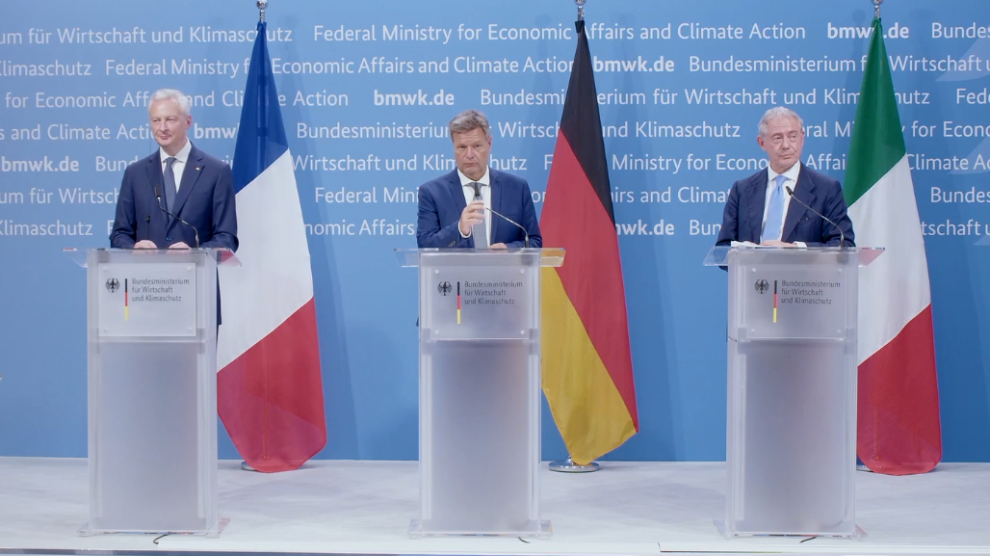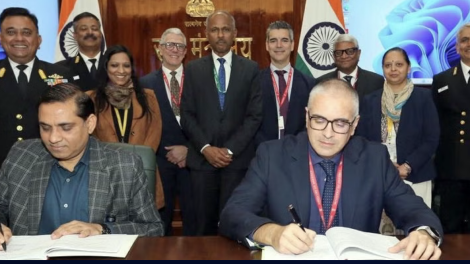The EU’s top economies set out to cooperate on CRMs. On Monday, key ministers from France, Germany and Italy held a trilateral discussion in Berlin about supply chain resilience and increasing the EU’s minerals self-reliance, aiming to coordinate their countries’ approaches and nudge the rest of the EU in the same direction.
- Germany’s Robert Habeck (Economy and Climate), France’s Bruno Le Maire (Economy) and Italy’s Adolfo Urso (Enterprise and Made in Italy) took part in the meeting, which is set to become a more structural forum.
- The trio announced two future meetings: one in Italy, in October, about digital tech, and another in France on greentech, both future-proofed sectors that require a steady supply of critical raw materials.
Think strategically. Building atop the European Union’s Critical Raw Materials Act, which sets targets and quotas to resume the bloc’s CRM production and reduce excessive foreign dependency, the three ministers talked about how to effectively pursue these objectives.
- They vowed to expand data exchange practices and cooperation in the fields of minerals extraction, refining, processing, recycling and ESG standards…
- … while keeping the industries looped in, to work on a green transition that may cater to their needs and ultimately foster the emergence of European industrial champions.
China has (officially) entered the conversation. Decades of Western outsourcing have granted Beijing an iron grip on key CRM sectors, especially in the field of refining and greentech minerals. As a result, EU countries depend on foreign CRM imports (most often Chinese) by over 90% in several sectors. And as Russia’s energy blackmail has demonstrated, that kind of exposure is a systemic risk.
- It’s a matter of European sovereignty, explained Minister Urso, recalling that the EU’s founding fathers based the bloc’s foundation on (not by chance) on pooling coal and steel industries.
- “We forgot about that, and then remembered when energy went missing. We do not want to exchange dependence on Russia with depending on China.”
- Ministers Habeck and Le Maire also explicitly named Beijing during the press conference, signalling a more clear-cut and harshening pan-European stance towards the risk it poses.
What about financing? Both France and Italy are in the process of setting up ad-hoc funds to direct money towards these goals, with Germany set to replicate their efforts soon, as Minister Habeck confirmed. The three ministers renewed their countries’ call to set up a European Strategic Fund to jointly finance CRM resilience – an EU Commission-issued idea that’s been losing steam due to internal EU opposition.
- “It is important that the next [EU] regulation [contains] legal certainty, acceleration, red tape cutting and, hopefully, resources,” said the Italian minister.
The Transatlantic dimension. The trilateral happened a few weeks after Minister Urso’s trip to Washington. And before leaving, he had contacted his French and German counterparts to find a common line on the Inflation Reduction Act – as opposed to Ministers Habeck and Le Maire’s more self-centred mission to the US.
- Friend-shoring CRM production is one of the paths to align the green transition process among like-minded partners, as is the case with the US’ Inflation Reduction Act and the EU’s Net-Zero Industry Plan.
- France, Germany, Italy and several other Western nations are already part of the US-led Minerals Security Partnership, which seeks to bolster supply chain resilience along these very lines.





